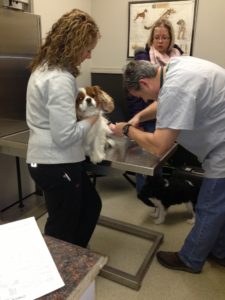 One of the easiest ways to maintain your pet’s health is to schedule a routine wellness exam. We recommend annual exams for pets aged 1 and older; twice yearly exams for those pets aged 7 and up. Remember 1 “pet year” equals between 5 and 7 human years. Puppies and kittens are vaccinated every 3-4 weeks, until about 16 weeks of age, which is when their maternal antibodies tend to weaken. You and your veterinarian will discuss your pet’s lifestyle and decide which vaccines will be given. For both dogs and cats, there are both “core” (mandatory) and optional vaccines.
One of the easiest ways to maintain your pet’s health is to schedule a routine wellness exam. We recommend annual exams for pets aged 1 and older; twice yearly exams for those pets aged 7 and up. Remember 1 “pet year” equals between 5 and 7 human years. Puppies and kittens are vaccinated every 3-4 weeks, until about 16 weeks of age, which is when their maternal antibodies tend to weaken. You and your veterinarian will discuss your pet’s lifestyle and decide which vaccines will be given. For both dogs and cats, there are both “core” (mandatory) and optional vaccines.Core vaccinations for Dogs
DHP/Parvo
This vaccine protects against canine Distemper, Hepatitis, Parvo Virus, and Parainfluenza. These diseases are caused by various contagious, highly infectious viruses that can cause symptoms ranging from vomiting, diarrhea, to respiratory signs.
Rabies
Rabies is a viral disease that is always fatal. It is transmitted through bite wounds from an infected animal. Rabies can be transmitted to humans. It is easily preventable by keeping your pet’s Rabies vaccine current and avoiding situations where they may come in contact with wild or unvaccinated animals. Dogs can be vaccinated at 12 weeks of age.
Other vaccines to consider
Lyme
Lyme disease is transmitted by tick bites. Unlike humans, most dogs do not develop the “bullseye rash.” In dogs, symptoms include fever, joint swelling,lethargy, vomiting. Lyme disease is very common in Rhode Island and while no vaccine offers 100% protection, by using tick preventative 12 months of the year, vaccinating for Lyme disease, and checking your pet each day for ticks, you are doing everything possible to protect your pet.
Bordetella (Kennel cough)
Bordetella causes a respiratory infection, most commonly seen as a non-stop hacking cough. Dogs in group settings, ie boarding kennels, doggie day care, grooming parlors, are at greater risk.
Leptospirosis
Leptospirosis is a bacteria most commonly transmitted through the urine of wild animals. No questionable characters in the neighborhood? Think again-any puddle that your dog walks through or drinks from is a source of contamination. Signs of Leptospirosis include vomiting, fever, lethargy, and loss of appetite. Lepto can lead to liver and/or kidney failure.
Canine Influenza
Canine influenza is caused by a “Flu” virus and can be spread by direct contact, through the air, or via contaminated surfaces. Signs include coughing, low grade fever, nasal discharge,and loss of appetite. In about 20% of cases, dogs can develop a high fever and pneumonia. Signs can be similar to kennel cough and exact diagnosis is determined with bloodwork or nasal swabs.
Core vaccinations for Cats
PVRC
Also known as FVRCP, this vaccine protects against a complex of viruses that can cause sneezing, runny eyes, nasal discharge and in the case of feline panleukopenia, diarrhea and severe dehydration. The viruses are passed cat to cat, with young kittens being most commonly affected.
Rabies
Although outdoor cats are more likely to come in contact with wild animals, indoor cats also need to be protected against this fatal disease. Each year in RI, indoor cats are exposed, either by bats or other wildlife entering the home, or by escaping outside for an unplanned jaunt.
Other vaccines
Feline leukemia
Otherwise known as “FELV”, feline leukemia is transmitted through mating and bite wounds. Those cats that go outside are at highest risk, and any new cat brought in to your home should be tested. Feline leukemia can cause a variety of issues, everything from cancer to secondary infections caused by the destruction of the immune system.
Not all vaccines need to be given yearly- you and your veterinarian can determine what vaccines should be given to keep your pet healthy.
